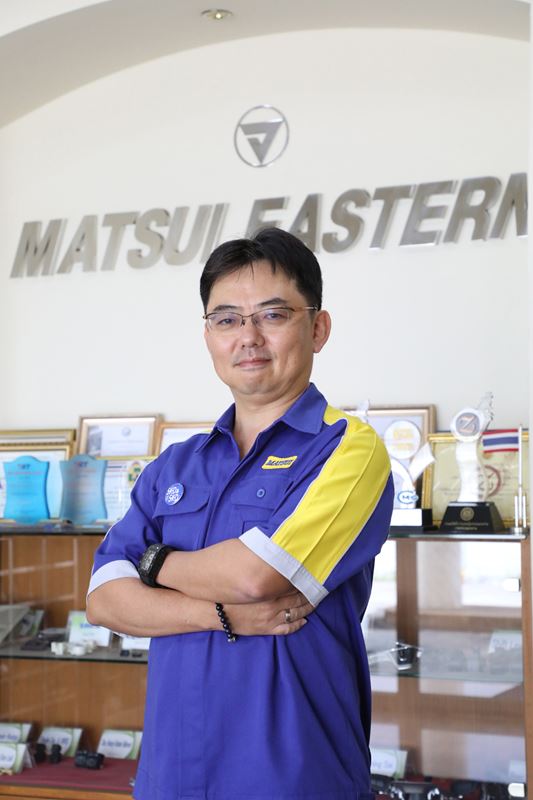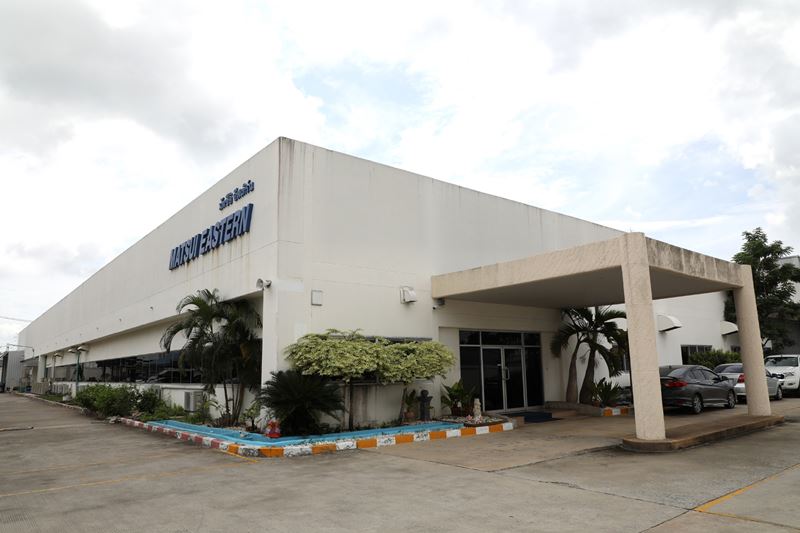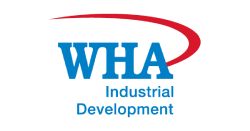บทความ
MATSUI EASTERN (THAILAND) CO. LTD PROVIDES PRODUCTS OF HIGH QUALITY AND STANDARDS EXCEEDING CUSTOMER EXPECTATIONS
05/09/2562
Matsui Eastern (Thailand) Co. Ltd is the Thai entity of Matsui Co. Ltd, headquartered in Toyohashi city, Japan. Established in 2003, the company is a mass-production contractor and manufacturer of automobile parts such as key locks, mirrors, power-windows, and various kinds of switches located around the driver’s seat. They procure components and materials mainly in Thailand, assemble them, and then deliver their products to parts manufacturers. Their factory operates on a total floor area of approximately 7,727 sq.m. which stands on 7.4 rai of land (1 rai = 1,600 sq.m.)
The company specializes in mass-production by contract, but they are able to meet the needs of customers flexibly, from small quantities to large lots. Their line of products consists of a wide variety of items such as resin and substrates, and the company’s technology is utilized in the production of various products. The company’s Action Agenda is to “put things into quick action, at any cost, and keep on trying until you successfully complete it”.
Mr. Hiromitsu Matsui, Chairman, explains that local procurement of components and materials in Thailand is relatively easy. But what is most required, he emphasizes, are keen eyes and skills to seek out the most appropriate and essential components and materials to increase values from a number of products, which include both good and bad, and then to assemble them. This is made possible by their know-how and tradition they have built up in Japan for more than a half-century. “The company provides high quality, high standards and quick delivery which exceed customer expectations,” he says, “That is why we are needed.”
Manufacturing in Thailand is now facing a time of significant innovative changes as a result of penetration by various industries, and the increase of workers’ wages. The company continues to take on these challenges and as part of its efforts, they are now undertaking the task of self-manufacturing some components. For instance, they introduced three molding machines which were prompted by the great flood that occurred eight years ago. Promotion of self-manufacturing also contributes to hedging production risks and they intend to continue this effort to mitigate any delays to client deliveries.
Mr. Matsui is acutely aware of the need of ‘Thailand plus one’, which means to include neighboring countries such as Cambodia and Laos into the production system. “The low-cost competition is occurring as a result of wage increases,” he outlines. “Despite this, it is not possible to pass it simply onto products, and it is unacceptable to manufacture products which are cheap, but low quality. On the other hand, new markets and business environments are growing in Thailand where existing markets have matured.” The company plans to advance and keep developing solutions through distinguishing their business activities from competitors in neighboring countries.
Community contribution through high school graduate recruitment scheme
They introduced a vocational training system five years ago for the purpose of contributing and developing local community links. High school graduates from the Isarn north-east region of Thailand are recruited, as many gave up seeking a higher education due to lack of financial resources. The company employs them for a limited term of two years in this scheme. A boarding house is prepared for the trainees to live in during the term of training, with wages paid. They work alongside regular workers, so they can learn the basics of manufacturing and acquire some grounding as a member of society. At the same time, they are also exposed to efforts distinctive to Japanese companies, such as kaizen (continuous improvement) and 5S, which includes seiri-seiton (decluttering). In this way, the trainees work in the same production line as those in Japan for two years and practice developing their skills. Later on, they will be assigned to a new workplace, in accordance with their preferences, and approximately 40 young people have made use of this scheme and completed the training so far.
The company built its factory in Eastern Seaboard Industrial Estate (Rayong), located in an inland area near the province’s border with Chonburi. Mr. Matsui is pleased there is no need to worry about floods, and also no problem regarding the supply of water and electricity. The transportation system including a high-standard highway is well-developed, and access to other areas is convenient, as it takes only 40–50 minutes by car to Siracha, which has a large population of Japanese residents. Many workers live in areas near the industrial estate, so the company has little difficulty recruiting new workers. Many client companies such as Japanese factories are also located nearby, making the location ideal.
Mr. Matsui notes that the staff of WHA Industrial Development who manage the industrial estate are consistently upbeat and friendly. “They perform field service regularly, asking Is there anything you are worried about?”, he says, “and they provide quick responses to inquiries made by any company in the industrial estate. They are hearty supporters who can be relied upon in any time of need”, Mr. Matsui said.
Contact
Mr. Hiromitsu Matsui
Chairman, Matsui Eastern (Thailand) Co. Ltd
www.matsui-asia.co.th
Tel: +66 2 324 0216

Remarks: The article was written for WHA Group Newsletter August 2019 Vol. 44

